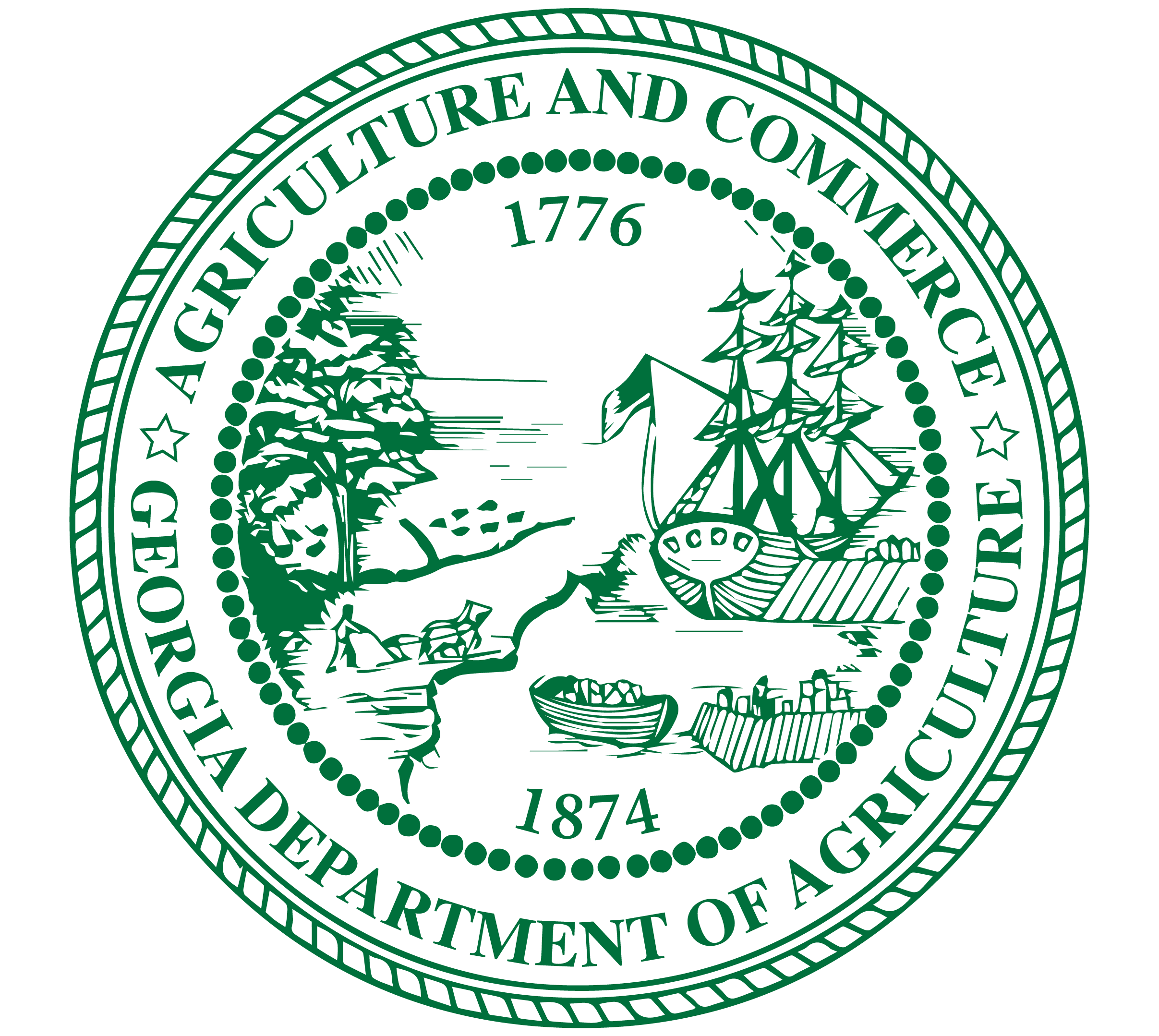This guidance document is intended to provide general information and the basic requirements needed to obtain a license to operate as a small poultry producer.
Licensing with the Georgia Department of Agriculture (GDA) is required for small poultry producers who slaughter, process, on his or her own premises, and sell twenty thousand (20,000) birds or less of their own raising within a calendar year. He or she may not buy or sell poultry products prepared under another exemption in which he or she claims the Producer/Grower Exemption. The facility used to slaughter or process the poultry is not used to slaughter or process another person's poultry.
This includes poultry producers who sell intra-state only and who sell whole raw poultry and/or cut up poultry parts (no added ingredients permitted) for distribution in commerce. Poultry can be sold fresh from the farm within 48 hours of processing, or in a frozen state. Poultry not sold at the farm location can only be sold in a frozen state with a mobile meat license obtained from the GDA Food Safety Division.
Quail is not applicable to the small poultry operation exemption (i.e. 20,000 processed in 1 year), as this exemption only applies to domesticated birds" (chickens, turkeys, ducks, geese, guineas, ratites, or squabs) as defined in 9 CFR 381.1, Poultry Products Inspection Regulations Definitions. Quail and other migratory waterfowl or game birds (i.e. pheasant, partridge, grouse, or pigeon) are excluded from the definition in 9 CFR 381.1, and therefore do NOT qualify for the small poultry exemption. Since the 2016 Georgia quail law was passed, making quail amenable at the state level, all quail sold retail or wholesale is now required to come from an inspected source.
The GDA inspects poultry processing facilities as required by State of Georgia regulations to ensure compliance. An annual license fee of $100.00 is required for small poultry processors.
Establishments must follow sanitary processing, careful inspection by establishment personnel, and the production of poultry products that are consistent with good commercial practices (GCP) and not adulterated.
GCP violations include, but are not limited to:
- Live birds entering the scalder
- Mistreating birds or handling them in a way that will cause harm or death
Records
The poultry producer must notify the Compliance Section of GDA at least 48 hours prior to slaughter.
Your facility records shouldinclude the following information:
- Poultry slaughter dates.
- Number of poultry slaughtered each date and the cumulative total per permit period.
- Temperature control log(s) that monitor poultry cool down and storage (w/ thermometer calibration). (Support)
- If a poultry producer uses a municipal water supply, it must make available a water report, issued under the authority of the State or local health agency, certifying or attesting to the potability of the water supply.
- Establishments that utilize a private well as their water supply, must provide documentation (i.e., bacteriological water testing results from a certified laboratory) attesting to the potability of the water supply.
- Well water potability testing must be conducted at least twice (every six months) per calendar year.
Basic Minimum Requirements
NOTE: Special labeling statements and claims must be approved by the GDA Program Manager. Special labeling statements and claims include, but are not limited to the following: “Raising claims, Breed Claims, and All-Natural Claims”: Guideline for Special Statements and Claims Pg. 13
- Facility Construction
- Grounds and pest control. Establishments must have in place a pest management program to prevent the harborage and breeding of pests on the grounds/official premises and within establishment facilities. Pest control substances used must be safe and effective under the conditions of use and not be applied or stored in a manner that will result in the adulteration of product or the creation of insanitary conditions.
- Establishment buildings, including their structures, rooms, and compartments must be of sound construction, be kept in good repair, and be of sufficient size to allow for processing, handling, and storage of product in a manner that does not result in product adulteration or the creation of insanitary conditions.
- Walls, floors, and ceilings within establishments must be built of durable materials impervious to moisture and be cleaned and sanitized as necessary to prevent adulteration of product or the creation of insanitary conditions.
- Walls, floors, ceilings, doors, windows, and other outside openings must be constructed and maintained to prevent the entrance of vermin, such as flies, rats, and mice.
- Plumbing
- The system must provide sufficient quantities of water to required locations throughout the establishment;
- Properly convey sewage and liquid disposable waste from the establishment;
- Prevent adulteration of product, water supplies, equipment, and utensils and prevent the creation of insanitary conditions throughout the establishment;
- Provide adequate floor drainage in all areas where floors are subject to flooding-type cleaning or where normal operations release or discharge water or other liquid waste on the floor;
- Prevent back-flow conditions in and cross-connection between piping systems that discharge wastewater or sewage and piping systems that carry water for product manufacturing. An air gap is the space located between the fill hose/pipe and the vessel/bucket that is being filled. The air gap/backflow device of the fill hose or pipe to adequately protect the water from backflow contamination.
- Prevent the backup of sewer gases.
- Bathroom Facilities
- Dressing rooms, toilet rooms, and urinals must be sufficient in number, ample in size, conveniently located, and maintained in a sanitary condition and in good repair at all times to ensure cleanliness of all persons handling any product. They must be separate from the rooms and compartments in which products are processed, stored, or handled.
- Lavatories with running hot and cold water, soap, and towels, must be placed in or near toilet and urinal rooms and at such other places in the establishment as necessary to ensure cleanliness of all persons handling any product.
- Refuse receptacles must be constructed and maintained in a manner that protects against the creation of insanitary conditions and the adulteration of product.
- Hand Washing
- Hand washing facilities shall be conveniently located and easily accessible for all employees in the poultry processing area. The hand washing sink must provide hot and cold water and be equipped with handsoap and paper towels.
- Hands must be properly washed before beginning operations, between each preparation step, after every break, and as frequently as required to prevent contamination.
- Sanitary Operations
- All food-contact surfaces, including food-contact surfaces of utensils and equipment, must be cleaned and sanitized as frequently as necessary to prevent the creation of insanitary conditions and the adulteration of product.
- Non-food-contact surfaces of facilities, equipment, and utensils used in the operation of the establishment must be cleaned and sanitized as frequently as necessary to prevent the creation of insanitary conditions and the adulteration of product.
- Cleaning compounds, sanitizing agents, processing aids, and other chemicals used by an establishment must be safe and effective under the conditions of use. Such chemicals must be used, handled, and stored in a manner that will not adulterate product or create insanitary conditions. Documentation substantiating the safety of a chemical's use in a food processing environment must be available to GMIS inspection program employees for review.
- Product must be protected from adulteration during processing, handling, storage, loading, and unloading at and during transportation from official establishments
- All equipment must be properly stored to prevent contamination between uses.
- Sewage
- Sewage must be disposed into a sewage system separate from all other drainage lines or disposed of through other means sufficient to prevent backup of sewage into areas where product is processed, handled, or stored. When the sewage disposal system is a private system requiring approval by a State or local health authority, the establishment must furnish GDA with the letter of approval from that authority upon request.
- Lighting
- Adequate shatter proof lighting and/or coverings must be used throughout the facility.
- Employee Hygiene
- Cleanliness. All persons working in contact with product, food-contact surfaces, and product-packaging materials must adhere to hygienic practices while on duty to prevent adulteration of product and the creation of insanitary conditions. (Hair coverings should be worn by all workers engaging in the processing and handling of exposed product).
- Clothing. Aprons, frocks, and other outer clothing worn by persons who handle product must be of material that is disposable or readily cleaned. Clean garments must be worn at the start of each working day and garments must be changed during the day as often as necessary to prevent adulteration of product and the creation of insanitary conditions.
- Disease control. Any person who has or appears to have an infectious disease, open lesion, including boils, sores, or infected wounds, or any other abnormal source of microbial contamination, must be excluded from any operations which could result in product adulteration and the creation of insanitary conditions until the condition is corrected.
- Packaging Materials
- Packaging material must be of food grade material and stored in a sanitary manner.
- Product labeling
All labels must be legible in type and size. Labels must include the following:
- The processor’s name and address
- Date of packing
- Name of the product
- Handling Statement (Keep refrigerated or Frozen)
- Safe Handling Statement
- Net Weight Statement (If poultry is sold by weight, a certified scale must be available)
- The statement “Exempt P.L. 90-492” must be applied to the label.
- Cold Storage
- All food must be stored in a manner to prevent contamination and inhibit the growth of microbial organisms. Food under refrigeration must maintain an internal temperature of 40°F or below. Frozen food is maintained in a frozen state.
- Poultry Product Distribution/Sales
- The producer/grower may sell, intrastate, the poultry products he or she prepares to other businesses for resale as meat or meals, including a distributor, hotel, restaurant, retail store, institution, or small enterprise when the product is produced under a State exemption.
- Waste Management
- Poultry Processor must provide a waste removal permit/letter. Waste includes offal, feathers, and blood.
- Contact the GDA’s Livestock and Poultry Division for disposal guidance at 404-656-3665.
- Rules & Regulations of the State of Georgia 40-13-5 Dead Animal Disposal: https://rules.sos.state.ga.us/gac/40-13-5
- Natural Resources Conservation Services: http://offices.sc.egov.usda.gov/locator/app
- Rules Of Georgia Department Of Agriculture Chapter 40-7-1 Retail Food Sales: https://rules.sos.state.ga.us/gac/40-7-1
- Contact your local UGA County Extension Office for handouts and information on composting methods or other acceptable methods of disposal in Georgia: https://extension.uga.edu/
- The State of Georgia Environmental Protection Division (EPD) approves water management and disposal plans.


